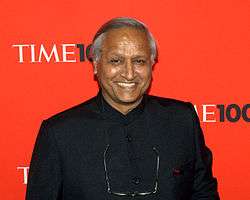Bunker Roy
| Bunker Roy | |
|---|---|
|
Roy at Time 100 event, 2010 | |
| Born |
Sanjit Roy 2 August 1945 (age 71) Burnpur, present-day West Bengal |
| Nationality | Indian |
| Alma mater | St. Stephen's College, Delhi |
| Occupation | Social activist & founder of BarefootCollege |
| Spouse(s) | Aruna Roy (m. 1970) |
Sanjit "Bunker" Roy (born 2 August 1945) is an Indian social activist and educator who founded the Barefoot College. He was selected as one of Time 100's 100 most influential personalities in 2010 for his work in educating illiterate and semi literate rural Indians.[1]
Early life
He attended The Doon School from 1956 to 1962, and St. Stephen's College, Delhi from 1962 to 1967.[2]
Roy was the National Runner-up in squash in 1964,[3] and participated in three world squash championships representing India.[2][4]
In 1970, he married Aruna Roy.[2]
Barefoot College
Bunker is a founder of what is now called Barefoot College.[5] After conducting a survey of water supplies in 100 drought prone areas, Roy established the Social Work and Research Centre in 1972.[5] Its mission soon changed from a focus on water and irrigation to empowerment and sustainability.[5] The programs focused on siting water pumps near villages and training the local population to maintain them without dependence on outside mechanics, providing training as paramedics for local medical treatment, and on solar power to decrease dependence and time spent on kerosene lighting.[5]
He was recognised in 2010 in Time for the programs of the college which have trained more than 3 million people in skills including solar engineers, teachers, midwives, weavers, architects and doctors.[1]
Other work
Roy was appointed by Rajiv Gandhi to the government's Planning Commission. He recommended that legislation be created that would apply a "code of conduct" for non-governmental organisations. He also proposed that a national council be created that would recommend "legitimate" organisations to the government and monitor their activities. Both of these recommendations were "fiercely" opposed as mechanisms that could be used to promote patronage of favoured groups and quell organisations that were not supportive of a particular government or party.[6]
In 1983, he was the plaintiff in Roy v State of Rajasthan in which the Supreme Court struck down an emergency policy which had allowed women famine relief workers to be paid less than male workers.[7]
Roy has spoken at the TED conference,[8] in which he talks about how the Barefoot College "helps rural communities becomes self-sufficient."[9]
Awards
Roy has received:
- The Jamnalal Bajaj Award – 1985 – "Outstanding Contribution in Application of Science and Technology for Rural Development"[10]
- The St Andrews Prize for the Environment – 2003
- Schwab Foundation for Social Entrepreneurship – 2003 – one of 20 people recognised for Social Entrepreneurs of the Year for 2003.[11]
- The Robert Hill Award from the global Solar Community – 2009 – for his work in the promotion of photo-voltaics[12]
References
- 1 2 Mortenson, Greg. (29 April 2010) Sanjit 'Bunker' Roy The 2010 TIME 100. TIME. Retrieved on 2 June 2012.
- 1 2 3 bunker Roy (1 February 2006). Verghese, B. G., ed. Tomorrow's India: Another Tryst with Destiny. Penguin Books India. pp. 347–. ISBN 9780670058631. Retrieved 23 November 2012.
- ↑ TY – BOOK T1 – Youth A1 – India. Ministry of Education IS – v. 8–11 Page 16 SN – 0513-3289 UR – https://books.google.com/books?id=tC1qqQd6l5wC Y1 – 1964 PB – Ministry of Education of India.
- ↑ Elkington, John; Hartigan, Pamela (1 February 2008). The Power of Unreasonable People: How Social Entrepreneurs Create Markets That Change the World. Harvard Business Press. pp. 52–. ISBN 9781422104064. Retrieved 23 November 2012.
- 1 2 3 4 John, Mary (2003). Children's Rights and Power: Charging Up for a New Century. Jessica Kingsley Publishers. pp. 232–. ISBN 9781853026584. Retrieved 23 November 2012.
- ↑ Sumit Ganguly; Larry Diamond; Marc F. Plattner, eds. (13 August 2007). "The Role of Civil Society". The State of India's Democracy. Johns Hopkins University Press. pp. 157–. ISBN 9780801887918. Retrieved 23 November 2012.
- ↑ Epp, Charles R. (15 October 1998). The Rights Revolution: Lawyers, Activists, and Supreme Courts in Comparative Perspective. University of Chicago Press. pp. 253–. ISBN 9780226211619. Retrieved 23 November 2012.
- ↑ TNN (28 October 2012). "'Students untapped forces of social change'". Times of India. Retrieved 23 November 2012.
- ↑ Bunker Roy. "Bunker Roy: Learning from a barefoot movement". TED. Retrieved 23 November 2012.
- ↑ "Archives – 1985 Science and Technology". Jamnalal Bajaj Foundation. Retrieved 23 November 2012.
- ↑ "Swiss award for Bunker Roy". The Hindu. 22 September 2002. Retrieved 23 November 2012.
- ↑ "Memorable Points – National". Pratiyogita Darpan. Pratiyogita Darpan. November 2009. pp. 34–. Retrieved 23 November 2012.
External links
| Wikimedia Commons has media related to Bunker Roy. |
- Profile
- Bunker Roy at TED

